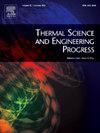Evaluation of moon base energy system integrated cooling and electrical energy supply: Working fluid selection and full-day energy analysis
IF 5.1
3区 工程技术
Q2 ENERGY & FUELS
引用次数: 0
Abstract
On the moon base, a sufficient energy supply is crucial for the normal operation of equipment. The surface temperature on the lunar day can reach as high as 390 K, providing cooling energy during the lunar day is a prerequisite for the long-term survival of humans on the Moon. Therefore, in response to the demands for cooling and electricity, this paper proposes a closed Brayton cycle (CBC) – organic Rankine cycle (ORC) – vapor compression refrigeration (VCR) system and establishes its mathematical model. The working fluids of the ORC – VCR are screened to obtain the power – generation and refrigeration capabilities. Toluene is selected as the best working fluid because it has higher ORC thermal efficiency and coefficient of performance (COP) under the condition of ensuring a relatively small radiator area. During the lunar day, the power of the ORC reaches a maximum value of 24.36 kW at noon. During the lunar night, as the temperature of the thermal energy storage system (TES) decreases, the power generation of the ORC increases, and the energy conversion efficiency also improves. This compensates for the performance decline of the CBC to a certain extent, but cannot completely reverse the weakening trend of the overall performance.
月球基地冷却与供电一体化能源系统评价:工作流体选择与全天能量分析
在月球基地,充足的能源供应对设备的正常运行至关重要。月球日的地表温度可高达390 K,在月球日提供冷却能量是人类在月球上长期生存的先决条件。因此,针对制冷和电力需求,本文提出了封闭布雷顿循环(CBC) -有机朗肯循环(ORC) -蒸汽压缩制冷(VCR)系统,并建立了其数学模型。对ORC - VCR的工质进行了筛选,以获得其发电和制冷能力。选择甲苯作为最佳工质,是因为在保证相对较小的散热器面积的情况下,甲苯具有较高的ORC热效率和性能系数(COP)。在阴历白天,ORC的功率在中午达到最大值24.36 kW。在月夜期间,随着TES温度的降低,ORC的发电量增加,能量转换效率也随之提高。这在一定程度上弥补了CBC的性能下降,但不能完全扭转整体性能的弱化趋势。
本文章由计算机程序翻译,如有差异,请以英文原文为准。
求助全文
约1分钟内获得全文
求助全文
来源期刊

Thermal Science and Engineering Progress
Chemical Engineering-Fluid Flow and Transfer Processes
CiteScore
7.20
自引率
10.40%
发文量
327
审稿时长
41 days
期刊介绍:
Thermal Science and Engineering Progress (TSEP) publishes original, high-quality research articles that span activities ranging from fundamental scientific research and discussion of the more controversial thermodynamic theories, to developments in thermal engineering that are in many instances examples of the way scientists and engineers are addressing the challenges facing a growing population – smart cities and global warming – maximising thermodynamic efficiencies and minimising all heat losses. It is intended that these will be of current relevance and interest to industry, academia and other practitioners. It is evident that many specialised journals in thermal and, to some extent, in fluid disciplines tend to focus on topics that can be classified as fundamental in nature, or are ‘applied’ and near-market. Thermal Science and Engineering Progress will bridge the gap between these two areas, allowing authors to make an easy choice, should they or a journal editor feel that their papers are ‘out of scope’ when considering other journals. The range of topics covered by Thermal Science and Engineering Progress addresses the rapid rate of development being made in thermal transfer processes as they affect traditional fields, and important growth in the topical research areas of aerospace, thermal biological and medical systems, electronics and nano-technologies, renewable energy systems, food production (including agriculture), and the need to minimise man-made thermal impacts on climate change. Review articles on appropriate topics for TSEP are encouraged, although until TSEP is fully established, these will be limited in number. Before submitting such articles, please contact one of the Editors, or a member of the Editorial Advisory Board with an outline of your proposal and your expertise in the area of your review.
 求助内容:
求助内容: 应助结果提醒方式:
应助结果提醒方式:


